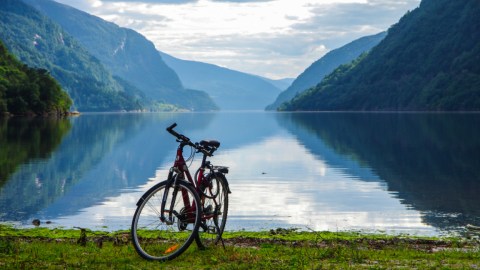Norway’s Latest Green Initiative: $1 Billion Bicycle Superhighways

Perhaps taking a cue from Germany’s “Autobahn for bikes,” Norway has announced plans for one of the most ambitious bicycle infrastructure projects in the world, according to a report by CityLab’sFeargus O’Sullivan.
The Scandinavian nation intends to construct a system of bicycle superhighways to safely connect nine of its biggest cities to outer suburbs. The proposed two-lane cycleways are part of a broader transportation initiative aimed at reducing vehicle emissions and achieving zero growth in car use by 2030. The cycleways are estimated to cost about $930 million.
Despite their environmentalist tendencies and outdoorsy reputation, Norwegians ride bicycles with much less frequency than their Danish and Swedish neighbors. The Norwegian government sees this as a major growth area, thus the investment in safe, direct, and well-maintained routes in and out of urban areas. Officials are willing to bet that infrastructure improvements will boost the number of people who commute on two wheels.
The major challenge, as O’Sullivan writes, is promoting travel-by-bike in a dark, wet, mountainous country. While the Norwegian coast isn’t as frigid as many would expect, proper maintenance of cycleways would require fervent snow removal in the winter. Lighting would also need to be a priority, as latitudinal realities necessitate artificial illumination from late fall to early spring.
Norwegian Values
The cycleway announcement continues to cement Norway’s status as a world leader in green initiatives. Oslo, the nation’s capital, has already said it plans to ban cars from its city center by 2019. We’ve also reported in the past about Norway’s keen interest in academic environmental research, as well as their more offbeat plans such as scouring sewers for biofuel.
Progressive values and Scandinavia seem to go hand-in-hand for a variety of reasons. But as former President of Denmark Anders Fogh Rasmussen explains in the video below, environmentalism makes a lot of sense in countries that would be most directly affected by climate change, the consequences of which could create an array of new geopolitical challenges:
Source: CityLab
Photo: Mikhail Varentsov / Shutterstock
**
Robert Montenegro is a writer and dramaturg who regularly contributes to Big Think and Crooked Scoreboard. He lives in Washington DC and is a graduate of Loyola Marymount University in Los Angeles.
Twitter: @Monteneggroll. Website: robertmontenegro.com.





